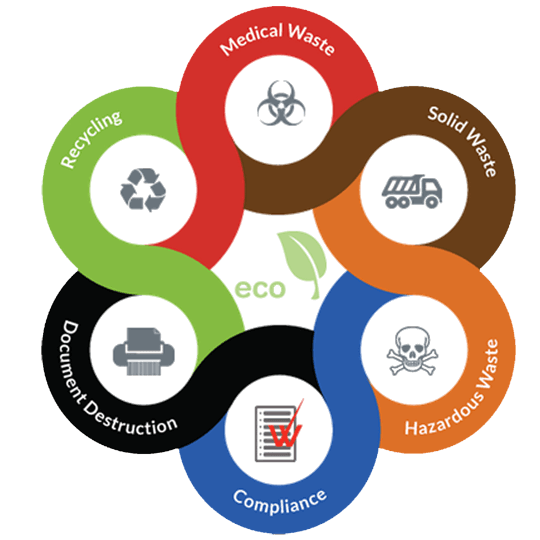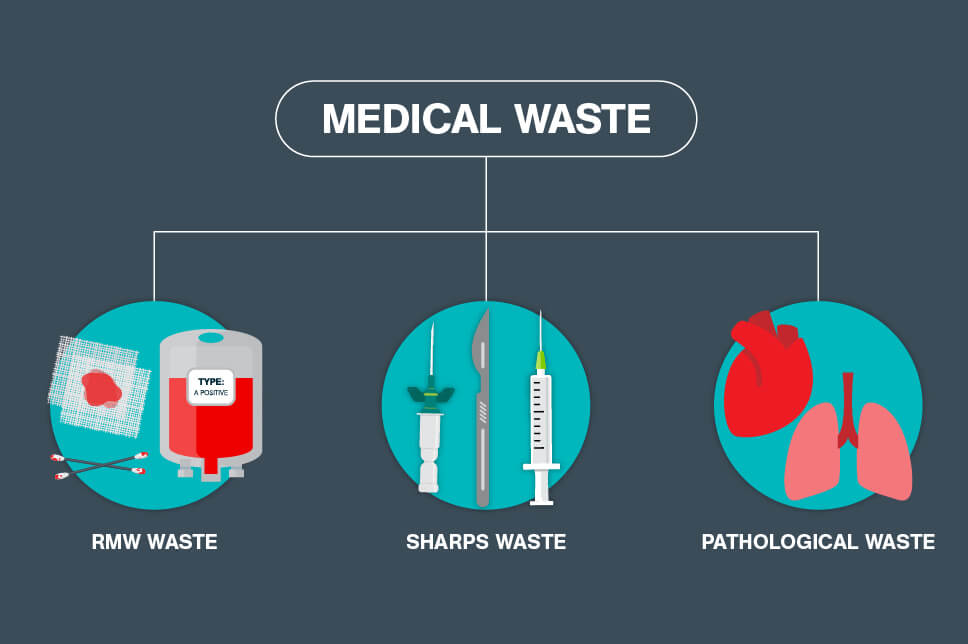Making Certain Safe Handling and Disposal of Medical Waste
Making sure risk-free handling and disposal of medical waste is of critical importance in health care settings. Inappropriate monitoring of medical waste can posture considerable risks to the environment, public wellness, and medical care workers. In this intro, we will certainly check out the significance of proper medical waste monitoring, the threats connected with incorrect handling and disposal, as well as the guidelines and strategies that can be implemented to guarantee its secure disposal.
Importance of Proper Medical Waste Monitoring
Correct medical waste administration is of utmost significance in making sure the safety and security and health of health care experts, individuals, and the basic public. Medical waste describes any type of waste created by medical care facilities throughout the medical diagnosis, therapy, or immunization of pets or human beings. This waste can pose significant wellness threats if not taken care of and taken care of correctly.
One of the key reasons why proper medical waste monitoring is crucial is to stop the spread of transmittable illness. Medical waste, such as used needles, polluted dressings, and organic materials, can lug damaging microorganisms. If not dealt with and gotten rid of appropriately, these virus can be transmitted to health care employees, people, waste handlers, and also the general public, bring about the possible episode of diseases.
Additionally, correct clinical waste management aids safeguard the setting - medical waste disposal. Clinical waste includes harmful materials, consisting of chemicals, drugs, and contaminated substances. When not taken care of suitably, these compounds can contaminate dirt, water bodies, and the air, posing a considerable danger to ecosystems and public health and wellness
Moreover, efficient clinical waste administration makes certain conformity with local guidelines and worldwide standards. Governments and regulatory bodies have established procedures and standards to guarantee the risk-free handling, storage space, transport, and disposal of medical waste. Following these policies is important to stay clear of legal consequences and maintain the track record and reputation of medical care facilities.
Risks of Improper Handling and Disposal

If medical waste is not effectively disposed of,Patients can also be subjected to these transmittable diseases. As an example, if polluted needles or other sharps are not dealt with in assigned puncture-proof containers, they might mistakenly prick clients, causing prospective infections. If medical waste is not segregated appropriately, there is a danger of cross-contamination between various kinds of waste, additional boosting the possibilities of illness transmission.
Incorrect disposal of medical waste can also have harmful impacts on the atmosphere and the public. If clinical waste is not treated and taken care of correctly, it can contaminate water sources, soil, and air, leading to the spread of illness and contaminants. This can have lasting repercussions on ecosystems and public health and wellness.
Standards for Safe Handling of Medical Waste
Applying reliable procedures for the secure handling of medical waste is vital in making sure the security of healthcare specialists, clients, and the basic public. These guidelines are essential in decreasing the risks linked with the handling and disposal of medical waste, such as infections, injuries, and ecological pollution.
First and primary, healthcare facilities need to develop a comprehensive waste administration plan that follows regional, national, and worldwide laws. This plan must consist of clear instructions on waste partition, product packaging, storage space, transportation, and labeling. It is important to divide different kinds of waste, such as sharps, infectious products, pharmaceuticals, and non-hazardous waste, to avoid cross-contamination and advertise safe disposal.
In addition, healthcare employees must obtain extensive training on appropriate waste handling methods. They should be educated on the prospective dangers of clinical waste, the proper use of personal protective equipment (PPE), and the proper treatments for managing, transferring, and taking care of different kinds of waste.
Additionally, health care facilities must regularly keep track of and investigate their waste administration methods to ensure compliance with guidelines. This includes performing regular assessments, evaluating waste handling treatments, and supplying feedback and training to employee.
Effective Approaches for Waste Disposal
To make certain the safe handling and disposal of medical waste, it is necessary to use reliable approaches for garbage disposal. Clinical waste can position substantial dangers to public wellness and the atmosphere otherwise taken care of and dealt with correctly. For that reason, healthcare centers and waste administration organizations must implement ideal approaches to alleviate these threats.
One effective approach for garbage disposal is segregation. It involves dividing various kinds of clinical waste based upon their qualities. Segregation enables the appropriate therapy and disposal of each waste group, decreasing the potential for contamination or injury. Health care centers must provide clear standards and training to personnel members on just how to set apart waste properly.

Furthermore, health care centers should collaborate with accredited waste monitoring firms to ensure proper disposal of medical waste. These business have the know-how and tools required to securely get rid of and deal with of clinical waste in compliance with laws and finest techniques.
Training and Education for Healthcare Professionals
Medical care specialists play an important role in making sure the safe handling and disposal of medical waste with comprehensive training and education. It is essential for health care service providers to have a deep understanding of the prospective risks connected with medical waste and the proper methods for its monitoring. By receiving correct training, medical care experts can lessen the prospective transmission of transmittable conditions, click here to read stop ecological contamination, and safeguard both themselves and the public.

In addition, training programs must emphasize making use of individual protective equipment (PPE) and proper hand health techniques when taking care of clinical waste. medical waste disposal service. Healthcare experts need to know exactly how to appropriately get rid of and use of PPE to safeguard themselves from potential exposure to dangerous products. They should additionally be enlightened on the significance of normal handwashing and the proper use hand sanitizers to lessen the spread of transmittable conditions
Continuing education and learning and normal updates on medical waste administration techniques are important for medical care professionals. As guidelines and standards evolve, it is vital to keep health care companies educated about any type of adjustments in protocols and finest techniques. This will make sure that they remain up-to-date and preserve a high requirement of safety in getting rid of and taking care of of clinical waste.
Conclusion
In final thought, appropriate handling and disposal of clinical waste is important to ensure the safety and security of health care professionals, people, and the setting. Ignoring to follow policies and standards can lead to different dangers and dangers. Carrying out efficient methods for waste disposal and offering suitable training and education for medical care specialists are crucial in keeping a secure healthcare atmosphere. By adhering to these practices, we can reduce the potential dangers linked with clinical waste.
Medical waste refers to any waste produced by medical care facilities during the medical diagnosis, therapy, or booster shot of humans or animals. If medical waste is not set apart effectively, there is a threat of cross-contamination between different types of waste, additional boosting the possibilities of illness transmission.
It is important to divide various kinds of waste, such as sharps, contagious materials, pharmaceuticals, and non-hazardous waste, to avoid cross-contamination and promote safe disposal. WasteX Medical Waste Disposal.
To make sure the safe handling and disposal of clinical waste, it is essential to employ reliable approaches for waste disposal. Furthermore, medical care centers need to develop a normal waste collection and transport routine to protect against waste accumulation and reduce the threat of crashes or contamination.